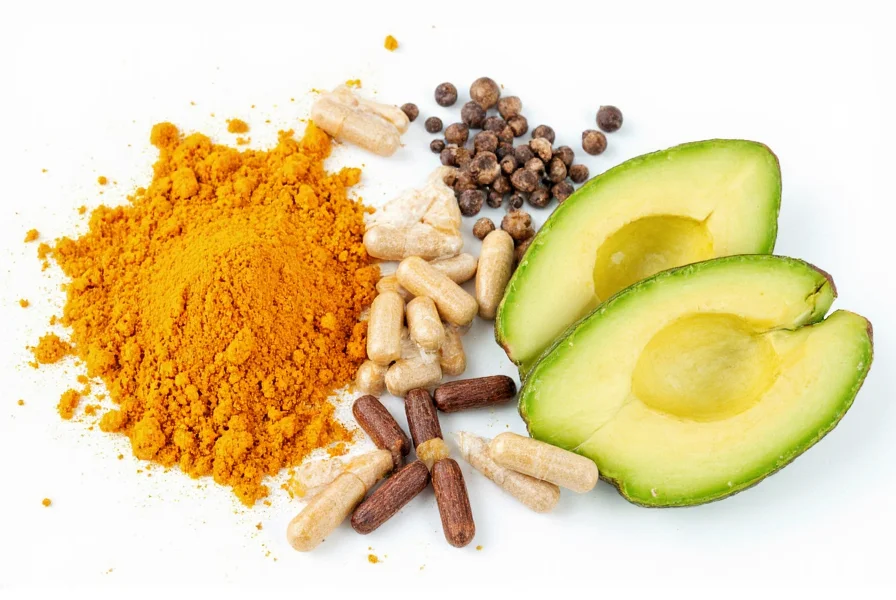Understanding the optimal timing for turmeric consumption is crucial for maximizing its health benefits. As a fat-soluble compound, curcumin—the active component in turmeric—requires dietary fats for proper absorption. Scientific research consistently shows that taking turmeric without consideration for timing and accompanying foods significantly reduces its bioavailability and therapeutic potential.
The Science Behind Turmeric Absorption
Curcumin has notoriously poor bioavailability when consumed alone. Studies published in Planta Medica demonstrate that curcumin's absorption increases dramatically when combined with piperine, the active compound in black pepper. This combination can boost curcumin bioavailability by up to 2,000%. Additionally, because curcumin is fat-soluble, consuming it with healthy fats like avocado, olive oil, or coconut oil enhances absorption through the lymphatic system.
Research from the Journal of Ayurveda and Integrative Medicine indicates that taking turmeric on an empty stomach results in rapid elimination from the body, with blood concentrations peaking at just 30-60 minutes before declining. When consumed with food, particularly fats, absorption increases significantly and remains in the bloodstream longer.

Optimal Timing Scenarios
Different health goals require different timing approaches for turmeric consumption. Understanding these scenarios helps maximize specific benefits:
| Health Goal | Recommended Timing | Scientific Rationale |
|---|---|---|
| General wellness | With largest meal of day | Maximizes absorption through dietary fats while maintaining consistent blood levels |
| Inflammation management | With dinner | Provides highest concentration during nighttime when inflammatory processes peak |
| Digestive support | 15-30 minutes before meals | Stimulates bile production for better fat digestion |
| Sleep quality improvement | 1-2 hours before bedtime | Leverages turmeric's potential anti-anxiety effects without digestive disruption |
Dosage Considerations and Timing
The relationship between dosage and timing significantly impacts turmeric's effectiveness. Clinical studies typically use doses between 500-2,000 mg of standardized curcumin extract daily. For optimal results:
- Divided dosing: Split larger daily doses (over 1,000 mg) between morning and evening meals
- Consistency matters: Daily consumption maintains therapeutic blood levels
- Avoid high doses on empty stomach: Can cause gastrointestinal discomfort
- Consider formulation: Liposomal or nanoparticle formulations may have different timing requirements
A 12-week study in the Journal of Medicinal Food found that participants who took standardized curcumin with their evening meal showed significantly greater reductions in inflammatory markers compared to those who took it with breakfast, suggesting timing affects therapeutic outcomes.
Potential Interactions and Timing Considerations
Turmeric can interact with certain medications, making timing particularly important for some individuals:
- Blood thinners: Space turmeric consumption at least 2-3 hours apart from medications like warfarin
- Diabetes medications: Monitor blood sugar closely as turmeric may enhance effects
- Iron supplements: Take at different times as curcumin may interfere with iron absorption
- Antacids: Avoid taking simultaneously as reduced stomach acid may decrease absorption
Individuals with gallbladder issues should consult their healthcare provider before taking turmeric, as it stimulates bile production which could exacerbate certain conditions.
Common Timing Mistakes to Avoid
Many people unknowingly reduce turmeric's effectiveness through common timing errors:
- Taking turmeric on an empty stomach (reduces absorption and may cause discomfort)
- Consuming without fat sources (limits bioavailability to less than 1%)
- Forgetting the black pepper component (misses 2,000% absorption boost)
- Inconsistent daily timing (creates fluctuating blood levels)
- Taking with calcium-rich foods (may bind curcumin and reduce absorption)
Research from the American Journal of Clinical Nutrition shows that adding just 20mg of piperine to curcumin supplements dramatically increases both the absorption rate and duration of curcumin in the bloodstream.
Personalizing Your Turmeric Timing
The ideal timing for turmeric varies based on individual factors:
- Metabolism speed: Faster metabolizers may benefit from divided dosing
- Current health conditions: Inflammatory conditions often respond better to evening dosing
- Daily routine: Consistency with existing habits improves adherence
- Sleep patterns: Those with sleep disturbances may find evening dosing beneficial
Tracking your response to different timing approaches for 2-4 weeks can help identify your personal optimal schedule. Note changes in inflammation markers, digestive comfort, energy levels, and sleep quality when adjusting your turmeric consumption timing.
Frequently Asked Questions
Can I take turmeric first thing in the morning on an empty stomach?
While some people tolerate morning turmeric consumption on an empty stomach, research shows this approach significantly reduces absorption and may cause gastrointestinal discomfort. For optimal results, take turmeric with your first meal containing healthy fats. If using turmeric specifically for digestive benefits, consume 15-30 minutes before breakfast instead.
How long before bedtime should I take turmeric for sleep benefits?
For sleep support, take turmeric 60-90 minutes before bedtime with a small snack containing healthy fats. This timing allows curcumin to reach optimal blood concentration during the initial sleep cycle. Avoid taking large doses too close to bedtime as the digestive process might interfere with falling asleep for some individuals.
Does the timing of turmeric affect its anti-inflammatory properties differently than other benefits?
Yes, timing affects different benefits variably. Evening dosing appears more effective for inflammation management as inflammatory processes often peak during nighttime. For cognitive benefits, morning consumption with breakfast may provide better daytime support. Digestive benefits work best when taken before meals. Research in Phytotherapy Research indicates that timing should be aligned with your specific health goals for maximum effectiveness.
How soon after taking turmeric can I expect to feel benefits?
Most people don't experience immediate effects from turmeric. For inflammation reduction, consistent daily use for 4-8 weeks is typically needed before noticeable improvements. Some report digestive benefits within days, while cognitive and mood improvements may take 2-3 weeks of consistent use. Blood tests measuring inflammatory markers often show changes within 2-4 weeks of proper dosing and timing.
Should I adjust turmeric timing if I'm taking multiple supplements?
Yes, supplement timing coordination matters. Space turmeric at least 2 hours apart from calcium supplements and iron supplements, as these minerals can bind to curcumin. If taking multiple fat-soluble supplements (like vitamins A, D, E, K), consume them together with a fatty meal to maximize absorption of all compounds. Consult your healthcare provider for personalized timing recommendations when combining multiple supplements or medications.











 浙公网安备
33010002000092号
浙公网安备
33010002000092号 浙B2-20120091-4
浙B2-20120091-4